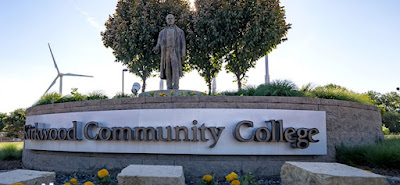Nicholas Johnson
The Gazette, January 27, 2022, p. A4
As Dad pulled into Uncle Chet’s Iowa farmyard, the first thing I spotted was my older cousin’s shiny, new motorcycle. Would he give me a ride? He proudly obliged. We sped up the dirt farm road to the intersection and back, thankfully without incident.
Once back in Iowa City, I blurted out my overwhelming desire for a motorcycle. Dad didn’t say “no.” He just said I should talk to my friend Russ about it.
“Russ” was Dr. Russell Meyers, University of Iowa chair of neurosurgery and a pioneer of ultrasonic neurosurgery. I just knew him as a friendly guy at my folks’ parties who played boogie-woogie on our living room piano while others swayed.
Dr. Meyers’ described to me the brain surgery he provided motorcycle riders after accidents. I never again rode a motorcycle.
Years later I watched such an accident. Two students, the man navigating, the woman clutching him, without helmets or protective clothing, were speeding south on Riverside Drive. He lost control, and they went screaming down the road on bare skin.
They were exercising their “freedom,” like others today who refused COVID vaccination, and are now filling overcrowded hospitals or among the 850,000 dead.
My question, for this column, is: How should the cost of their care (or a lifetime of disability payments) be allocated?
Those causing another’s loss pay for it. Borrow your neighbor’s lawn mower, break it, and the civilized norm is what Thomas Friedman applied to the U.S. in Iraq: “the pottery store rule: You break it, you own it.” You pay for the lawnmower repairs.
This norm is also the law in many contexts. To have known, or ought to have known, that your actions could result in someone’s death can give rise to a criminal charge of manslaughter, or civil liability for wrongful death.
Why should the same principles not apply to someone who causes economic losses to others by negligently doing harm to oneself? Let’s say, motorcycling without a helmet, extreme sports like wingsuit flying and solo climbing without a safety rope – or refusing a COVID vaccination? [Photo credit: Wikimedia, Creative Commons 3.0]
For the sake of argument, let’s grant such folks the “freedom” to do these things. Most of us don’t like to hear about or see anyone suffer severe pain, injury or death. But these individuals have only themselves to blame. What harm have they done to us?
Plenty, as it turns out. The extra costs and stress on first responders and health workers at the time of the incident. If the person survives, the continuing, and perhaps lifetime, costs of treatment and disability payments. If they die, the costs of funerals and burial.
If the individual was supporting dependents, the dependents have lost her or his future earnings (a major item in wrongful death cases) and suffer emotional distress.
And all of us have lost what the person might have contributed: their skilled workmanship, start-up businesses, inventions, cures, sense of humor.
Solutions? Start by acknowledging their “freedom” isn’t free. Others are paying for it.
Nicholas Johnson is the former co-director of the Iowa Institute for Health, Behavior and Environmental Policy. Contact: mailbox@nicholasjohnson.org
First motorcycle ride. Recollection of personal experience; no recorded source.
Dr. Russell Meyers. Taylor J. Abel MD1, Timothy Walch PhD1, and Matthew A. Howard III MD1, “Russell Meyers (1905–1999): pioneer of functional and ultrasonic neurosurgery,” Journal of Neurosurgery, v. 125, Issue 6, pp. 1589-1595, Dec. 2016, https://thejns.org/view/journals/j-neurosurg/125/6/article-p1589.xml#affiliation0
Students’ accident. Recollection of personal experience; no recorded source found.
850,000 dead. CDC, “COVID Data Tracker,” https://covid.cdc.gov/covid-data-tracker/#datatracker-home (last visited Jan 19, 2022)
Friedman’s “pottery store rule.” Thomas L. Friedman, “Present at … What?” New York Times, Feb. 12, 2003, https://www.nytimes.com/2003/02/12/opinion/present-at-what.html (“The first rule of any Iraq invasion is the pottery store rule: You break it, you own it. We break Iraq, we own Iraq -- and we own the primary responsibility for rebuilding a country of 23 million people that has more in common with Yugoslavia than with any other Arab nation.”)
Manslaughter. “Manslaughter,” Legal Information Institute, Cornell Law School, https://www.law.cornell.edu/wex/manslaughter (“Involuntary manslaughter is negligently causing the death of another person.”)
Wrongful death. “Wrongful Death Action,” Legal Information Institute, Cornell Law School, https://www.law.cornell.edu/wex/wrongful_death_action (“A civil action against someone who can be held liable for a death.”)
Extreme sports. “Extreme Sport,” Wikipedia, https://en.wikipedia.org/wiki/Extreme_sport (“Action sports, adventure sports or extreme sports are activities perceived as involving a high degree of risk. These activities often involve speed, height, a high level of physical exertion and highly specialized gear.”)
Rachel Brown, “41 Extreme Sports Listed from Intense to INSANE!” Active Cities, no date, https://activecities.com/blog/extreme-sports-listed-from-intense-to-insane/ (40. Wingsuit Flying, 41. Solo Climbing (without safety rope))

